Priscilla: A Sofia Coppola Film – An Intimate Look at Life Beside Elvis
Depeche Mode drew inspiration from an unexpected source for their iconic hit “Personal Jesus”: not from the globally worshiped singer Elvis Presley, but rather from Priscilla’s perspective of her husband. Priscilla’s memoir “Elvis and Me” ignited Martin Gore’s songwriting, and now fuels Sofia Coppola’s profoundly personal new film. Biopics have been front and center at the Venice Film Festival, exemplified by Bradley Cooper’s exploration of Leonard Berstein’s marriage in “Maestro”, Mann’s deep dive into Enzo Ferrari’s professional crisis in “Ferrari”, and Besson’s comic-inspired underdog story “Dogman”. Similarly, “Poor Things” tells a story about a woman, “Priscilla” offers a counterpoint to Baz Luhrmann’s characteristic larger-than-life Elvis, Coppola opts for subtlety and deep empathy, centering Priscilla Presley’s narrative, and largely keeps figures like Colonel Parker in the periphery.
From Teen Dream to Graceland Reality
The film delicately explores Priscilla’s (Cailee Spaeny) formative years, portraying her as an outsider attempting to navigate the intricacies of her position as she becomes a fixture in Elvis’s life. Coppola vividly reconstructs the quintessential fantasy scenario of the late 1950s: A shy, unassuming high school student catches the eye of a music icon (Jacob Elordi). The movie explores familiar tropes of a teen fanfic, the young lover captivated by an older, charming man. As Elvis gradually endears himself to Priscilla’s parents, she soon finds herself migrating to Graceland.
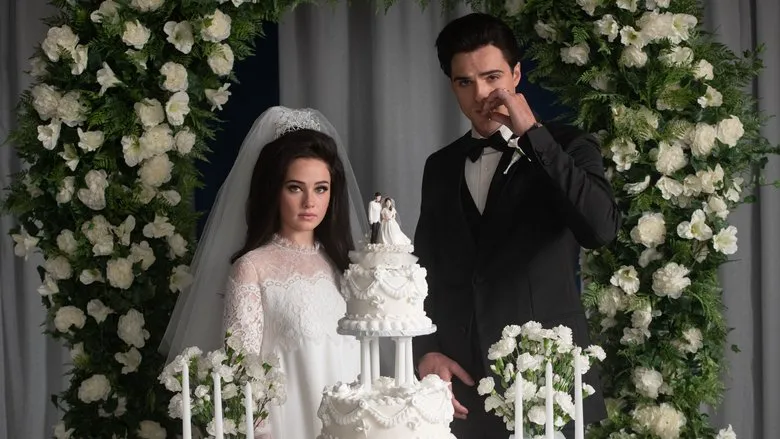
Cailee Spaeny’s portrayal of Priscilla Presley captures the transformative journey from innocent teen to Graceland resident.
Echoes of Lolita? Navigating Troubled Waters
“Elvis and Me”, and, by extension, Coppola’s film, invites parallels to Lita Grey’s memoir, “My Life with Chaplin.” Both texts provide the perspectives of young women intimately involved with men of immense cultural importance, sparking reductive comparisons to “Lolita”. Such parallels are more direct in the case of Grey, who purportedly inspired Nabokov’s tale. Yet, Coppola’s “Priscilla” intentionally averts descent into an exploitative narrative. Elvis is portrayed as seemingly abstinent, accusing Priscilla instead of superficiality. Elvis’ chaste behavior is explained by mystic wisdom or prescription side effects.
Faithful Adaptation and Sonic Landscape
Coppola serves as a committed translator of the written word to the big screen, she had the support of a producer for A24, Priscilla herself. Paradoxically, the Elvis Presley estate withheld endorsement from Coppola, denying the use of Elvis’ discography, the absence of his famous recordings does not compromise Coppola’s vision. Instead, female vocalists such as Patti Page and Alicia Bridges create an ambient soundscape, as the movie implies Elvis dismissed The Beatles out of hand.
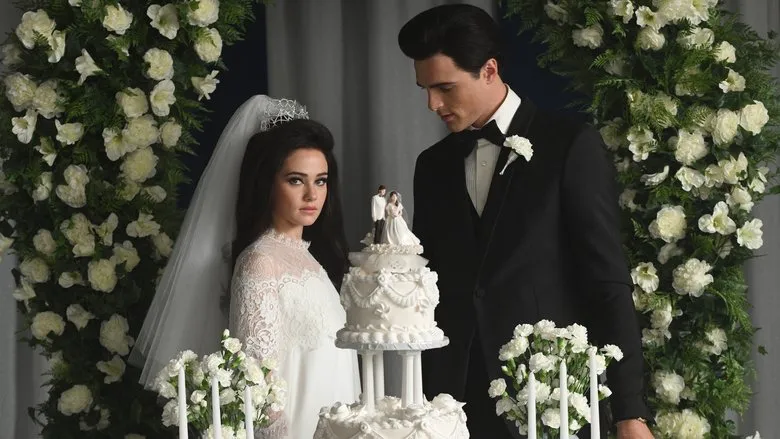
A contemplative shot of Priscilla, embodying the film’s introspective mood.
Beyond the Hits: Perspective and Authenticity
Following its release, Coppola’s film will undergo intense analysis concerned with its factual accuracy. After the publication of Priscilla’s memoir in the 1980s she faced repeated legal setbacks following its publication. The “Personal Jesus” status of the music icon renders silent acknowledgment of the King’s behavior (which he attributes to his mother) impossible. Lacking expertise in Elvis’s biography, the analysis focuses on the value of Priscilla’s own narrative.
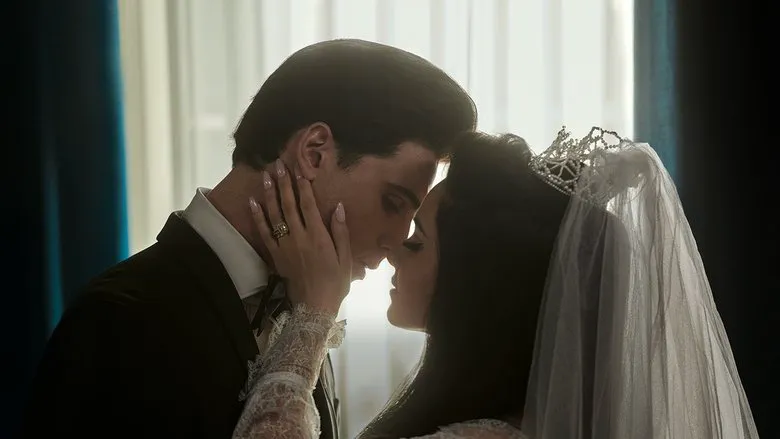
Elvis and Priscilla share what look to be an intimate moment.
Deconstructing the Myth, Amplifying the Woman
“Priscilla” seeks to examine both the deconstruction of celebrity culture and the loss of innocence through Priscilla’s biography. Rather than invalidate Elvis’ legend, Coppola’s film endeavors to present a shattering of ideals. Coppola explores themes of unconditional love that motivates Priscilla to enter into and maintain this relationship, without fully acknowledging that “dream they wished, isn’t the one coming true,” Coppola slowly approaches the Presley’s marriage. Throughout the movie’s extended runtime, there is a nuanced exploration of the couple’s courtship. As Priscilla is stuck in Las Vegas Elvis is recording music and touring - Coppola subtly invites audiences to consider a more clear-eyed understanding in hindsight.
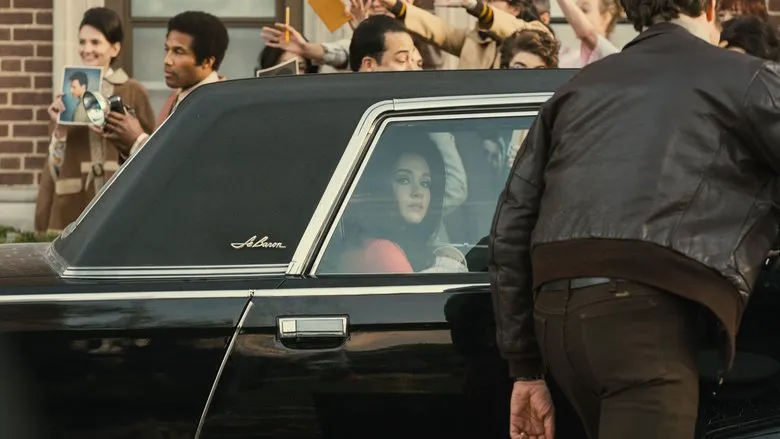
A powerful image contrasting Priscilla’s youth with the glamorous yet overwhelming world she enters.
Privilege and Isolation
An alien maturation is present in many of Coppola’s screenplays. Marie Antoinette remained an outsider in Versailles, Charlotte couldn’t transition to a life of high society, and Cleo struggles in her father’s shadow in “Somewhere.” Though alluring to outsiders, even affluence isolates an insider from everyday experience. While Elvis is surrounded by people and making music, the film suggest Priscilla remains isolated.
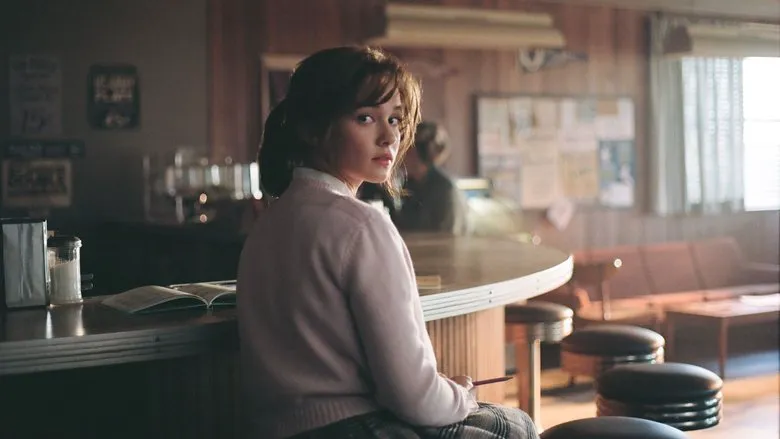
Priscilla is swarmed by photographers as if it were some kind of cage.
Coppola presents a portrait of shattered ideals through the story of Elvis told through Priscilla’s eyes.